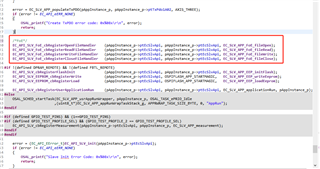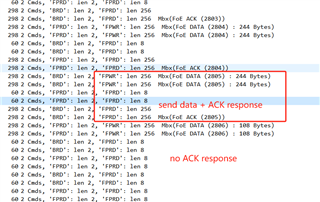Hi TI expert,
I encountered a problem while attempting to send a file over the FOE protocol. My device is a TMDS243GPEVM, and the SDK version I am using is mcu_plus_sdk_am243x_08_06_00_43. The EtherCAT master version is IgH EtherCAT master 1.6.0-rc1. The CCS project was imported from the SDK example: ethercat_slave_cia402_demo_am243x-evm_r5fss0-0_freertos_ti-arm-clang.
I made some modifications to the demo project by adding a few lines of code to register the callback function for the FOE protocol. The callback function defined in SDK: mcu_plus_sdk_am243x_08_06_00_43\examples\industrial_comms\ethercat_slave_demo\common\os\freertos\ESL_foeDemo.c.

I am utilizing the IGH foe_write command to send a file to the AM2434. However, upon entering the command, I encountered the error "Failed to write via FoE: FOE_TIMEOUT_ERROR."

In an attempt to diagnose the issue, I captured network packets using Wireshark. It appears that the Slave device did not respond with an "ACK" to the last packet, leading to a master FOE timeout error.

The last packet is 108 bytes, while the previous packets were 244 bytes. Could this difference in packet size be the reason why the slave is unable to process the frame?
Could you please help me refine this message?

